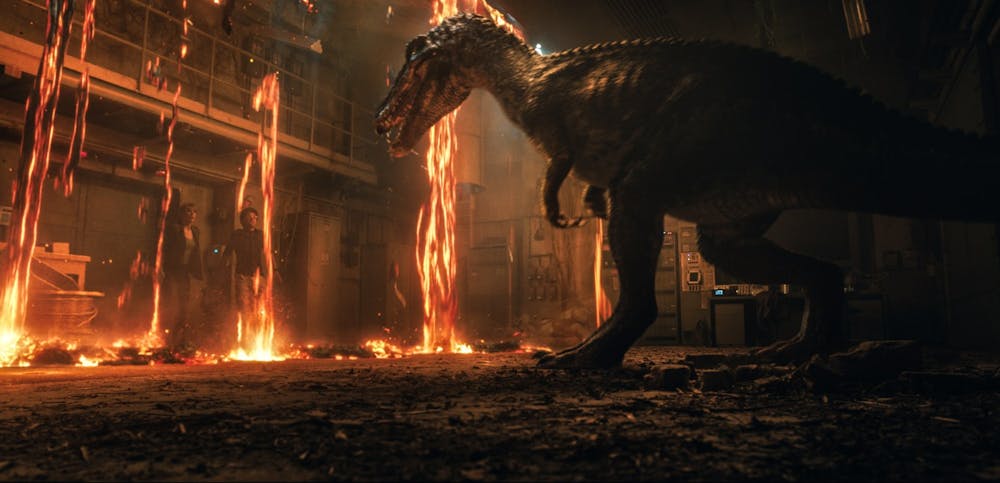Life, uh, finds a way to make dinosaurs uninteresting.
“Jurassic World: Fallen Kingdom” roared its way into a $145 million opening weekend. However, the film failed to evolve past timid action sequences, underdeveloped characters and predictable plot elements, thus culminating in another unnecessary addition to a desolate franchise.
The sun has set on Isla Nublar. Three years after the destruction of the Jurassic World theme park, Claire Dearing (Bryce Dallas Howard) and Owen Grady (Chris Pratt) return to the island to save the remaining dinosaurs from a volcano that is about to erupt. They soon discover yet another destructive breed of mutant dinosaur, while unveiling a sinister conspiracy that threatens the safety of the entire planet.
As a film, “Jurassic World: Fallen Kingdom” was remarkably unremarkable. Director J. A. Bayona was perfectly capable of catering to an audience that has been fed a healthy summer diet of superheroes, explosions and sweaty, one-dimensional men of action.
Pratt’s return as Grady suggests one thing: Don’t expect any nuance from a “Jurassic Park” sequel. Whereas the original film presented audiences with multifaceted characters, such as park creator John Hammond (Richard Attenborough) or paleobotanist Ellie Sattler (Laura Dern), “Jurassic World: Fallen Kingdom” cares little about personal growth. Grady begins the film as a stoic recluse and ends the film as a stoic recluse (who misses his pet).
The situation is much better for the film’s co-lead. However, Howard’s attempts to transform Dearing into a sympathetic conservationist still fall short of anything memorable. Her sole purpose in this film seems to revolve around contractional fulfillment. Why would the founder of a nonprofit organization with no discernable survival skills return to an island of dinosaurs? This is yet another question the film refuses to acknowledge.
Scenes featuring the digitally created dinosaurs are plentiful. One could even argue that these animals have now become the main characters of these films. Whether this is preferable is a question for the audience. Although, it seems as if Universal Pictures already has its answer.
There is also the question of musical accompaniment. Following his work in “Jurassic World,” Michael Giacchino (“Up,” Ratatouille,” “Cloverfield,” etc.) returns as the sequel’s musical composer. As you can imagine, his score only compliments the film’s embarrassingly gaudish tone.
Certain aspects of the film are surprisingly enjoyable. The final shot of Isla Nublar is particularly heartbreaking. Moreso, the circumstances surrounding Maisie Lockwood (Isabella Sermon), a newcomer to the franchise, are simply haunting.
“Jurassic World: Fallen Kingdom” is the perfect summer film for the modern American audience. It lacks substance, reeks of futility and ultimately relies on an unsophisticated understanding of good and evil.
In 1993, “Jurassic Park” was an unsuspecting cultural milestone. The film utilized the most up-to-date research of dinosaurs at the time. This passionate attention to scientific understanding resonated throughout the film. Art was being created from science.
“Jurassic World: Fallen Kingdom” fails to accomplish anything worthwhile. Instead, it has taken this art, diluted it from its exceptionalism and transformed the final creation into a mutant amalgamation of monsters, explosions and feeble attempts of scientific and cinematic progress.






